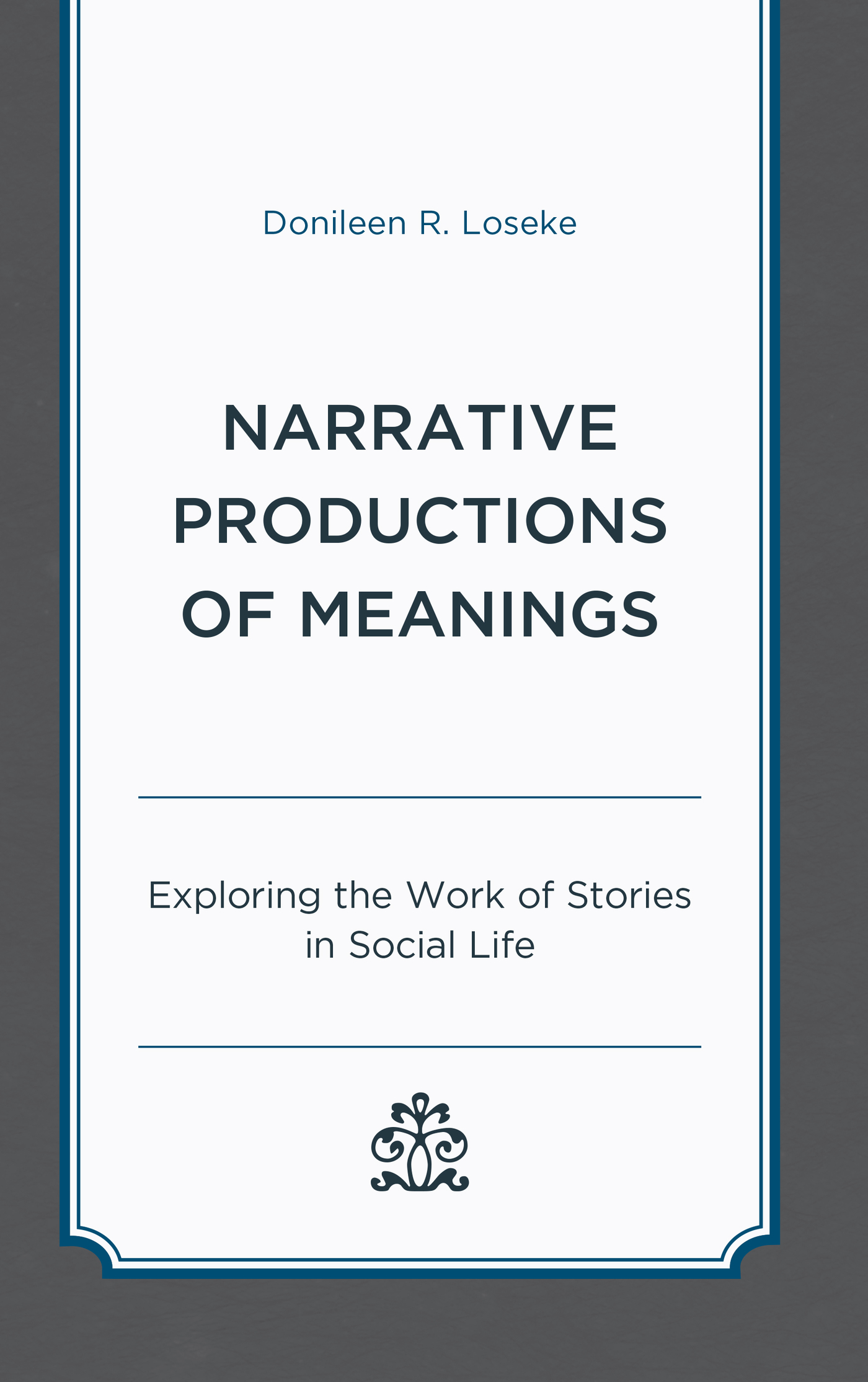Narrative Productions of Meanings
Narrative Productions of Meanings
Exploring the Work of Stories in
Social Life
Donileen R. Loseke
LEXINGTON BOOKS
Lanham Boulder New York London
Published by Lexington Books
An imprint of The Rowman & Littlefield Publishing Group, Inc.
4501 Forbes Boulevard, Suite 200, Lanham, Maryland 20706
www.rowman.com
6 Tinworth Street, London SE11 5AL
Copyright 2019 by The Rowman & Littlefield Publishing Group, Inc.
All rights reserved. No part of this book may be reproduced in any form or by any electronic or mechanical means, including information storage and retrieval systems, without written permission from the publisher, except by a reviewer who may quote passages in a review.
British Library Cataloguing in Publication Information Available
Library of Congress Cataloging-in-Publication Data
Names: Loseke, Donileen R., 1947- author.
Title: Narrative productions of meanings : exploring the work of stories in
social life / by Donileen R. Loseke.
Description: Lanham, MD : Lexington Books, [2019] | Includes bibliographical
references and index.
Identifiers: LCCN 2019001207 (print) | LCCN 2019013912 (ebook) | ISBN
9781498577786 (electronic) | ISBN 9781498577779 (cloth : alk. paper)
Subjects: LCSH: Narrative inquiry (Research method) | Meaning (Psychology) |
Social problems.
Classification: LCC H61.295 (ebook) | LCC H61.295 L67 2019 (print) | DDC
300.72/3--dc23
LC record available at https://lccn.loc.gov/2019001207
 TM The paper used in this publication meets the minimum requirements of American National Standard for Information Sciences Permanence of Paper for Printed Library Materials, ANSI/NISO Z39.48-1992.
TM The paper used in this publication meets the minimum requirements of American National Standard for Information Sciences Permanence of Paper for Printed Library Materials, ANSI/NISO Z39.48-1992.
Printed in the United States of America
Chapter 1
Narrative and Productions of Meaning
From the beginning of life onward, people are drawn to stories, the common term for what academics call narratives. The promise of bedtime stories persuades toddlers into bed, young children watch Disney movies endlessly. While taste for particular kinds of stories often changes over time both for individuals and for societies, the appeal of stories does not. It is not surprising that stories are everywhere. They are the stuff of conversations with family and friends; they are in sermons, lectures, speeches, and testimonies in courts and policy hearings. Stories circulate endlessly on web pages, in media of all forms, on Twitter, and Facebook; they are the typical form of advertisements as well as what is analyzed by therapists. As noted by Roland Barthes (1977, 79), storiesnarrativesare pervasive in social life in all times and in all places:
Narrative is present in myth, legend, fable, tale, novella, epic, history, tragedy, drama, comedy, mime, painting... stained glass windows, cinema, comics, news, conversations. Moreover, under this almost infinite diversity of forms, narrative is present in every age, in every place, in every society.... Nowhere is nor has been a people without narrative. All classes, all human groups, have their narratives.... Narrative is international, transhistorical, transcultural: It is simply there, like life itself.
This book is about how stories produce meaning; about how this meaning can be a tool for sensemaking, persuading, and justifying; and about how narrative meaning-making shapes both subjective understandings and material realities on all stages of social life. I will start by laying out some basic characteristics of meaning and meaning-making in the current era which serves to place stories and storytelling within their contexts as well as outline why and how it is that narrative meaning-making is so important.
Narrative and Meaning
Jerome Bruner argues that the principle function of the human mind is world making, forming meaning from the buzzing confusion of human experience (Bruner 1987, 11). Concern with questions about meaning is what unites a broad range of classical social theorists including philosopher Alfred Schutz, historian Max Weber, anthropologist Clifford Geertz, psychologist Sigmund Freud, and sociologists Peter Berger and Thomas Luckmann. Concern with meaning is shared by a variety of social theories including social constructionism, phenomenology, interactionism, and ethnomethodology. The following are some basic characteristics of meaning necessary to understand how narratives produce meaning and why this is important.
First, there are three types of meaning. Since the Enlightenment, academic observers of all varieties focus on examining cognitive meaning (Fisher 1984). While understanding what and how people think remains in the center of academic interest, scholars in a variety of disciplines now argue that emotion is a foundation of social life (for reviews, see Barbalet 2002; Marcus 2002; Mosi 2009) and that social changes have led to the increasing tendency of people to worry less about what is thought and more about what is felt (McCarthy 2017). Hence, a second type of meaning is emotional (Loseke and Kusenbach 2008; McCarthy 2017; Mosi 2009). Third, people are as much concerned about how the world should work as about how the world does work (Keen 2015; Pizarro 2000; Schwartz 2000); decisions are made based as much on evaluations of what is right as on what is practical or expedient (Fisher 1984; Jaspar 1992). This third kind of meaning, moral, is particularly important in an era characterized by dissention and disagreements. In short, understanding the power and importance of narrative meaning making requires appreciating how meaning is cognitive and emotional and moral.
Second, meaning has cultural, interactional, and personal dimensions. Chapter 2 explores how meaning is cultural because social orders contain circulating systems of meaning that can be components of a cultural tool kit (Swidler 1986) available for social actors to use as schemes of interpretation (Schutz 1970), interpretive structures (Miller and Holstein 1989), or membership categorization devices (Sacks 1972) which are general guidelines for how to think, feel, and act toward known and unknown people, objects, experiences, and events. On a case by case basis, people can choose to use, ignore, or modify their understandings of socially circulating meanings in order to comprehend and organize experience (Quinn 2005, 3; Gubrium and Holstein 1997, especially chapter 3).
Meaning also can be an interactional accomplishment. When systems of ideas are relatively shared, intersubjectivity is possible; intersubjectivity is the basis for interaction, interaction creates meaning. People therefore produce meaning in interactions. Finally, meaning is personal because, whether formed through face-to-face interaction, mediated through technologies, or located in texts, the unique experiences, agendas, and life circumstances of individuals influence what meaning is meaningful (Polkinghorne 1991). In short, meaning is cognitive, emotional, and moral; meaning can have cultural, interactional, and personal dimensions.
The final characteristic of meaning necessary to understand the importance of stories is, whether viewed through the lens of culture, interaction, or psychology, characteristics of the current era encourage a multitude of personal, social, and political problems surrounding meaning (see, for example, Alexander 2017; Calhoun 1994; Madsen et al. 2002; McCarthy 2017).
Next page
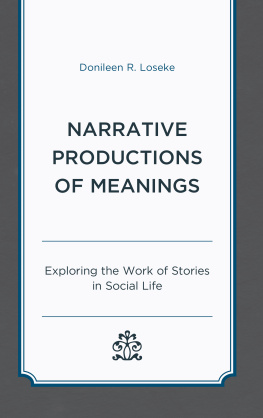
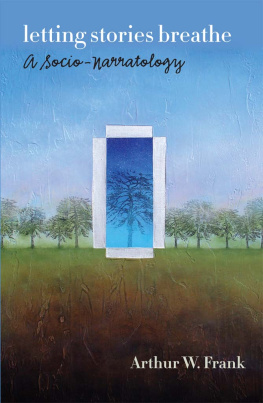

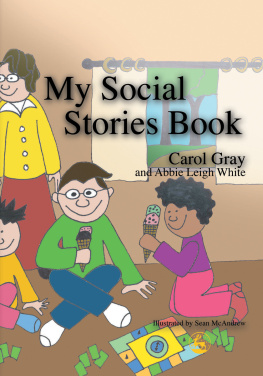
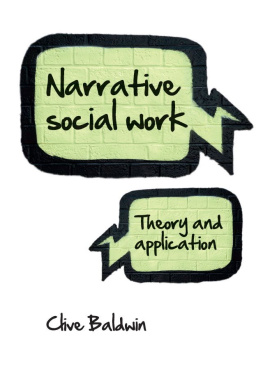

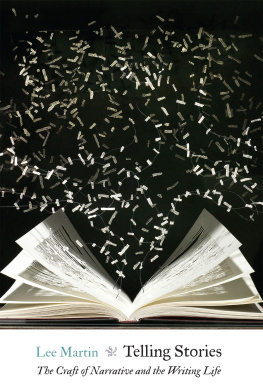

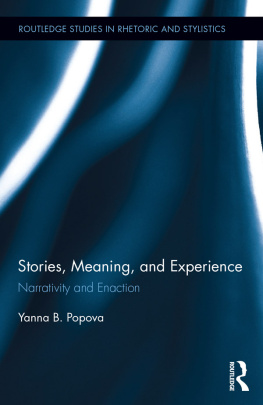
 TM The paper used in this publication meets the minimum requirements of American National Standard for Information Sciences Permanence of Paper for Printed Library Materials, ANSI/NISO Z39.48-1992.
TM The paper used in this publication meets the minimum requirements of American National Standard for Information Sciences Permanence of Paper for Printed Library Materials, ANSI/NISO Z39.48-1992.